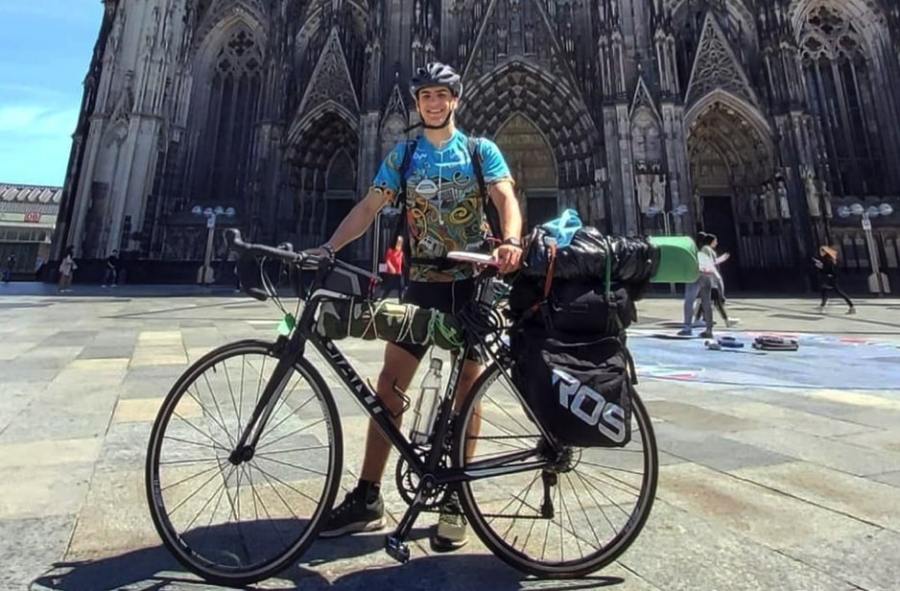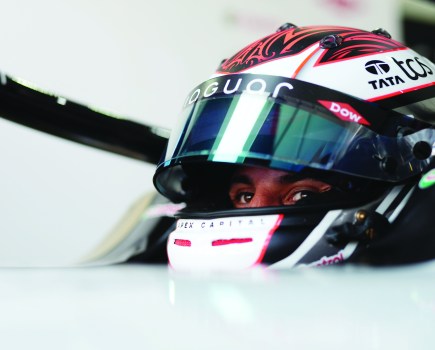A Greek student studying in Scotland cycled from Aberdeen to Athens when COVID restrictions left him stranded thousands of kilometers from his family.
Kleon Papadimitriou was stuck. As countries closed their borders due to the pandemic, he frantically tried to get flights from Aberdeen in northern Scotland, where he was studying, back to Athens in Greece, where his family were worrying about him.
When he did manage to book a flight, it got cancelled. And then again. And again. And even if he did find a connecting flight, what would happen if the second plane was cancelled, stranding him in the middle of the continent?
But Papadimitriou was 19 years old and worked out about five days a week: running, swimming, lifting weights and, just recently, cycling.
He thought: what if he could cycle down through Scotland? And then across England? Get a ferry to Rotterdam, and then cycle through the Netherlands?
And then through Germany and through Austria (maybe take a few detours to see some cathedrals, the odd area of outstanding natural beauty) and then over the Alps into Italy where he could take a second ferry, this time to western Greece, before cycling back to his hometown?
So Papadimitriou packs. He has a jacket and a tent and other essentials. Everything he brings he’ll have to carry for about 3,000 kilometers, but, for every t-shirt he leaves behind, that’s another day of cycling in his own stale sweat.
For most of the trip, he cleans himself with wet wipes though, he admits, “not every night.”
But the big problem, the one he faces almost immediately after setting off on 10 May, is far more serious: his knee hurts. And then, from turning around to watch for traffic, his neck begins to hurt too.
So, here’s what he does: he starts the day slow, ambling along until his knee is warmed up, then he ramps up the speed. And he takes rest days.
Usually just once a week, but when he arrives at his grandmother’s house in Germany and she insists on pampering him, he takes a little longer.
In short, he starts to treat cycling less like a commute and more like a workout. His knee stops hurting, but the pain in his neck remains.
When Papadimitriou starts off on his journey, he is struck by the enormity of the challenge. This will push him past his limits. What if he gets stuck halfway?
Whenever he wants to quit, he says to himself: “I’ll just make it to the end of the day, and I’ll quit tomorrow” and, after a few days of this, he’s cycled all the way through Scotland.
And then, a few days later, across northern England. Occasionally, he remembers how he had shared his plans on his Instagram and how embarrassing it would be to quit. But usually, he’s too tired to think about giving up.
That is, until a forest in Germany where he gets his fifth flat tire in two days. Papadimitriou finds himself overwhelmed.
He carries around a puncture repair kit and spare inner tyre tubes, but what’s to stop the replacement tyre from tearing again? And then again and again? So, he gives up.
Or rather, he intends on giving up, but first he has to take one of the repaired spare tubes and get out of the forest to somewhere safe where he can announce to the world that he feels weak and alone and would very much like for someone to come save him, please.
“I had to take a few breaths,” he says, “I had to let out my anger by throwing a few rocks and breaking some sticks. I had no choice but to fix the flat and keep going.”
Papadimitriou gets the bike working again and, at some point between when he began beating up the forest and when he cycled out of it, Papadimitriou gives up on the idea of giving up and cycles the rest of the way to Athens instead.
This is not a workout that Papadimitriou recommends. He lives off a diet of canned sardines and bread slathered with peanut butter.
He loses a few kilograms and his bodyfat drops. He doesn’t grow any muscle and, when he’s recuperating in Athens after the 48-day trip, he finds he is weaker than before he left. And tired.
Weeks later, his blood tests still show indications of muscle damage. It takes weeks to recover.
Papadimitriou intends to go back to college in Aberdeen. But until then, he’s working at a shop on a beach in southern Greece. While he’s selling swimwear and flip flops and renting out kayaks and paddle boats, he thinks about his next challenge.
Here’s what he wants to do: he is going to scale the almost-seven-kilometer-high peak of Aconcagua in Argentina, the highest mountain in the world outside of Asia.
And here’s what he says you should do:
“Set a goal that is outside of what you think you can achieve. Do your best to get there.
“Even if you don’t, the reality is that you will have already gotten out of your comfort zone, and that is growth, and that is really significant.”
Words: Shane Raymond







